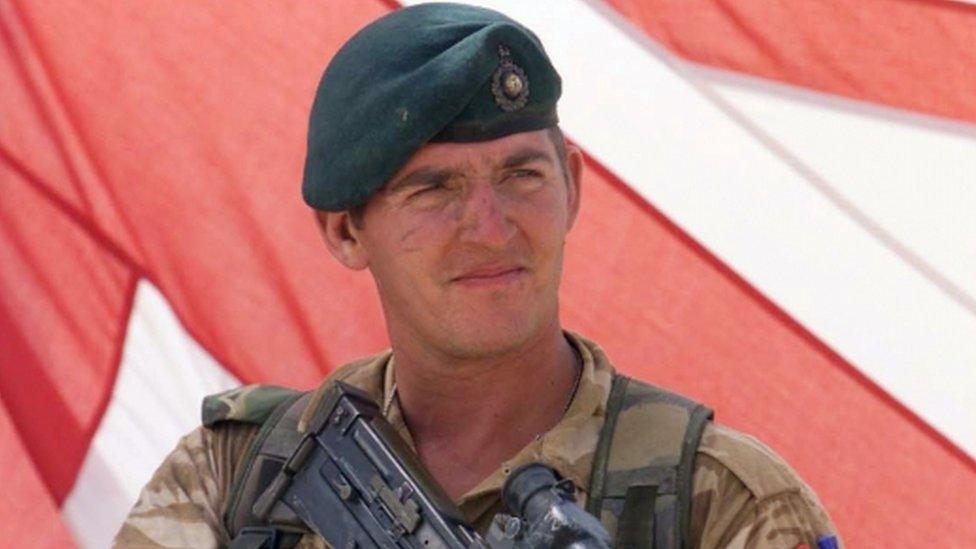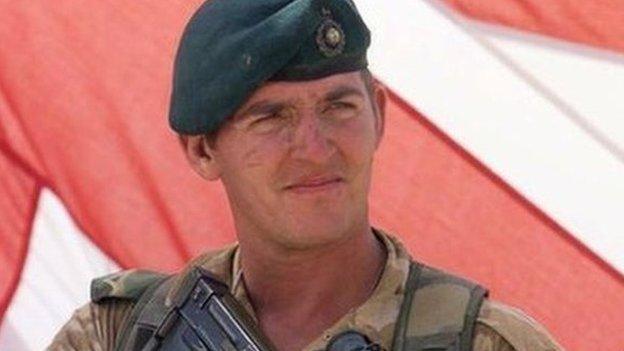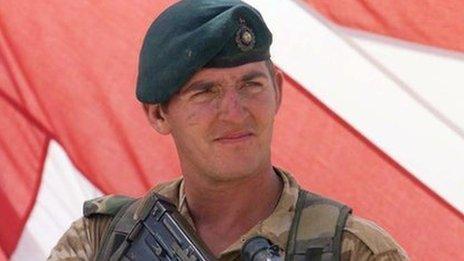Jailed Marine A's senior officers 'missed warning signs'
- Published

Sergeant Alexander Blackman was convicted of murder at a court martial in 2013
Senior officers missed signs that the unit of a now-jailed marine was suffering from exhaustion, a Royal Navy review has found.
Sergeant Alexander Blackman- known as Marine A - was convicted by a military court of murdering a Taliban fighter while serving with Plymouth-based 42 Commando in Helmand province in 2011.
The internal Royal Navy review released by the Ministry of Defence said several factors contributed to the incident.
Blackman is serving a life sentence.
The report found there was insufficient supervision, a perceived "overly aggressive" culture in 42 Commando and "moral disengagement" on the part of Blackman and his colleagues.
The former marine, of Taunton, Somerset, last week won the right to appeal against his conviction following the presentation of new evidence relating to his mental health at the time of the murder.
Shooting details
Footage from another marine's helmet-mounted camera showed Blackman shot his victim - who had been seriously injured in an Apache helicopter attack - in the chest at close range with a 9mm pistol.
Extract from helmet camera recording of incident in Helmand, Afghanistan
Blackman had denied murder, saying he believed the victim was already dead and he was taking out his anger on a corpse.
'Low professional standards'
A summary of the report into the incident revealed Blackman's commanding officer in J Company had been injured and a new officer took over at short notice.
It said that officer had not been prepared for the role and faced a considerable challenge in taking up this command.
"The face-to-face supervision by the officer commanding J Company of Checkpoint Omar, where Sgt Blackman's multiple was based, was insufficient to identify a number of warning signs that could have indicated that they were showing evidence of moral regression, psychological strain and fatigue," the report said.
It added: "Sgt Blackman allowed professional standards to slip to an unacceptably low level at Checkpoint Omar. His poor leadership was a significant contributory factor in the way the insurgent was treated by other members of the patrol.
"Sgt Blackman's rank was a significant contributory factor in preventing others within the patrol from questioning his orders or challenging his actions.
"Moral disengagement on the part of Sgt Blackman and the members of his multiple was a significant contributory factor in the handling and shooting of the insurgent."
Commando concerns
The review was completed in 2014.
It found there was significant evidence that 42 Commando's culture was perceived by many outside the unit to be "overly aggressive", and that concerns regarding the unit's approach were raised with the brigade commander by the commanding officer of a separate unit, 45 Commando.
The report continued: "However the brigade commander judged that 42 Commando's approach was appropriate given the circumstances. Therefore he did not formally reproach the commanding officer over his unit's culture."
The review also recognised the difficulty Royal Marines faced in dealing with enemies after engaging in conflict, highlighting the problem in "changing from a mindset which required him to kill an enemy to one which accepted having to administer first aid to an enemy in order to try to save his life".
The Royal Navy said the incident was "not consistent" with the Royal Marine's ethos, values and standards.
On Friday, a bail hearing will take place at the Royal Courts of Justice, which could see Blackman released in time for Christmas.
- Published6 December 2016

- Published16 September 2015

- Published22 May 2014

- Published6 December 2013
